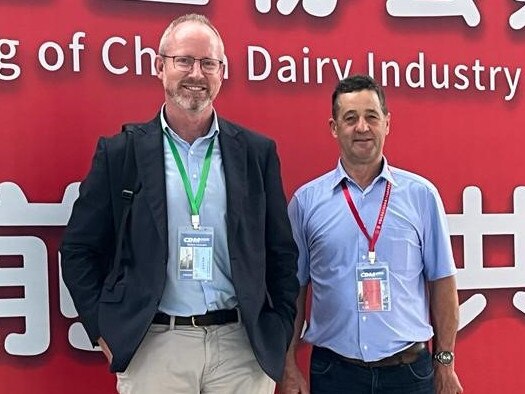Australian Dairy Farmers president Rick Gladigau on the future of China-Australia dairy trade
The days of sending significant numbers of Australian heifers to China have passed as the nation’s import demands change.
Chinese demand for Australian livestock is likely to languish as the economic powerhouse becomes self sufficient in cattle genetics, the head of Australian Dairy Farmers says.
ADF president Rick Gladigau recently returned from a tour of China, the first by Australian dairy representatives since the start of the coronavirus pandemic.
Throughout the 2010s, Australian farmers sold dairy heifers by the thousands to mainland China but demand for livestock has decreased significantly in the past three years.
“I think the days of sending significant numbers of Australian heifers to China are behind us,” Mr Gladigau said.
“That’s not to say we still won’t export there. But what I found in my travels around China is that their industry is becoming increasingly self sufficient in AI, in genetics.
“There’s been a real change in approach in China of mainly importing cattle and replenishing stock that way to developing their own programmes. So that will have a flow-on effect to the cattle market here in Australia.”

While much of the industrialised world was in lockdown in 2020 and 2021 due to the pandemic, China remained largely open and its demand for dairy reached record levels.
But its economic hit from coronavirus came later than Australia and much of the Western world, with the Chinese economy suffering a downturn for most of the 2022 calendar year.
Millions of tonnes of milk powder was stockpiled by the Chinese government and the recent sluggish economic situation has flowed onto world dairy demand.
“Like the rest of the world, China’s economy is slower than it was four or five years ago,” Mr Gladigau said.
“That has an impact on dairy markets worldwide. The fortunate position we have as an exporter is that Australian dairy is very well regarded by Chinese consumers.
“Our clean, green reputation was really evident a few years back with the huge sales of infant formula to China.”
Chinese consumer distrust of domestically-made infant formula stems back to the 2008 melamine scandal.
Milk and infant formula produced by the Sanlu Group at the time was adulterated with the chemical melamine, which caused kidney stones and other kidney damage in infants.
Melamine was used to increase the nitrogen content of diluted milk, giving it the appearance of higher protein content in order to pass quality control testing.
More than 300,000 children across China fell ill in 2008-09 from consuming tainted formula with more than 54,000 were hospitalised.
As a result, Chinese parents clamoured to purchase Australian-made infant formula.
The market demand created the ‘diagou’ market — Chinese-born students based in Australia who sold infant formula back to the economic powerhouse.
In October 2021, Bega chief executive Barry Irvin warned investors that fewer Chinese students based in Australia post-pandemic meant the end of the diagou boom.
“We have a view there’s structural change in the infant formula and toddler category market, particularly related to China and associated with the collapse of the diagou channel,” Mr Irvin said at the time.
It’s a view shared by Mr Gladigau.
“There’s increased local confidence from Chinese shoppers in Chinese milk,” he said.
“There was concern (about local milk) for many years after the melamine scandal, but that’s not as big a factor as it once was.”
Greater China still tops the league table for Australian dairy exports.
During the 2021-22 financial year, more than 303,397 tonnes exported of Australian dairy produce was exported to China compared to second-placed Singapore on 80,869 tonnes and third-placed Japan with 69,963 tonnes.
“Changing tastes in China when it comes to cheese is a real opportunity for Australia,” Mr Gladigau said.
“Chinese consumers have previously preferred cheese as a highly-sweetened product. We sampled some while we were there — strawberry flavoured cheese on a stick. A bit like eating cheesecake.
“But things are changing. Visiting Shanghai, you saw takeaway sales of pizza everywhere – so demand for mozzarella is growing. Australian cheddar is also growing in popularity.”





